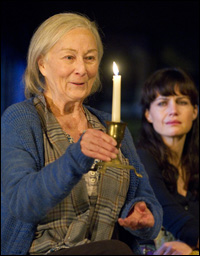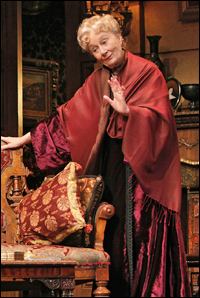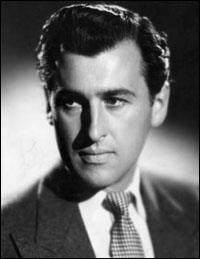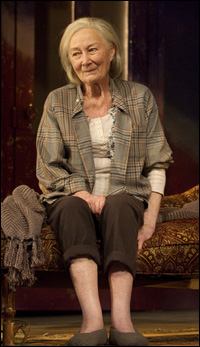
*
With Rosemary Harris' appearance in The Road to Mecca at the American Airlines Theatre, the actress officially enters her 60th year as a Broadway star. It's a big year for diamond jubilees — Elizabeth II on June 2 and Rosemary the Majestic on next Nov. 13.
Like all great artists who keep their heads down and do the work, Harris was astonished that this milestone had snuck up on her. "Oh, my gosh!" she exclaimed at the news. Then, after doing the math in her head, she nodded, "Yes, '52 — yes, yes."
On Nov. 13, 1952, the regal, RADA-trained actress emerged from the faux Main Stem flora 'n' fauna of British Guiana improbably named Mabel, a missionary's daughter, in Moss Hart's The Climate of Eden. The play lasted 20 performances, but it got her and two others in the cast (Penelope Munday and Ray Stricklyn) Theatre World Awards. The other two never appeared on Broadway again, but, by Harris' count, it has taken her 25 Broadway shows — all of them plays — to make it to Mecca.
"The Theatre World Award was the first award I ever got, and it meant so much because it was the first professional pat-on-the-back that you get," she recalled. By the time it was presented, however, she was back on the boards in Britain, playing The [never-named] Girl upstairs in The Seven Year Itch. "I remember thinking that I really wasn't quite right for it and saying to someone, 'Marilyn Monroe should be playing this. It's right up her alley.' And then, of course, she did.
"I wasn't that keen on what Eva Le Gallienne would have called 'boulevard comedies.' I wanted to be a serious classical actress. I'd rather have held Peggy Ashcroft's train than played comedy on the West End. The Seven Year Itch ran for a year, and, as soon as it finished, I hightailed it down to the Bristol Old Vic to do classical Shakespeare, and then a year later I graduated and got to the Old Vic.
"I did Desdemona opposite Richard Burton and John Neville. They both played Othello, and I was the one and only Desdemona between them. Then I was in Tyrone Guthrie's production of Troilus and Cressida. When that came to the Winter Garden in New York, I came with it. That was when I decided I wasn't going back.
"I felt much freer here. Of course, the name Old Vic was a sort of 'Open Sesame.' You just had to say Old Vic, and people didn't really care if you carried a spear or you had been playing leading parts. It just had a sort of cachet to it. But I just loved being here. I can't exactly define what it was. I never felt my roots were very deep because my childhood wasn't in England." (A Royal Air Force brat, she grew up in India.)
 |
||
| Rosemary Harris and Carla Gugino in The Road to Mecca. |
||
| photo by Joan Marcus |
When Harris counts 25 shows on Broadway, she is listing Kaufman and Ferber's fun-poke at the Barrymore clan, The Royal Family, as a single entry — although she has two Tony nominations to show for it: a Best Actress one in 1975 as Julie Cavendish, the bread-winning star of the family, and a Best Featured Actress one in 2009 as Fanny Cavendish, the matriarch of the acting dynasty. The only other performer twice-nominated for the same play is Judith Anderson (as Medea and then as Nurse to Zoe Caldwell's Medea); ironically, Dame Judith was to be the Cavendish matriarch of '75, but a back injury forced her to relinquish the role to Le Gallienne.
Rabb won a Tony for his direction of that '70s Royal Family, a theatrical valentine, and, early in the run, replaced George Grizzard as the John Barrymore facsimile to Harris' Ethel. It's Harris' most fondly remembered vehicle.
Her other Tony nominations were for Old Times, Heartbreak House, Pack of Lies, Hay Fever, A Delicate Balance and Waiting in the Wings; only Julie Harris, who holds the record for Tonys (5), has more Tony nominations (10). Notably, it took a queen — Eleanor of Aquitaine, opposite Robert Preston's Henry II, in The Lion in Winter — to win Harris the Tony. Her Drama Desk Awards came for Pack of Lies, The Royal Family, The Merchant of Venice, A Streetcar Named Desire and Old Times.
 |
||
| Harris in The Royal Family. |
||
| photo by Joan Marcus |
This daughter, Jennifer Ehle, followed Mama into the biz, and is now one up on her in the Tony department and was welcomed into the elite Theatre World Award club by Harris herself. They've done two films together ("Sunshine" and "The Camomile Lawn") — but never a scene, playing the old and young versions of the same character. They had a chance, via the recent Royal Family, but Ehle smartly opted to pass rather than go up against the legend of her mother's performance.
A mother-daughter teaming seems not a priority, either — since Ehle could have put her hand up for the role of the schoolteacher who befriends Harris' character in The Road to Mecca (the part is played by Roundabout regular Carla Gugino).
Harris herself is on board at the bidding of Roundabout's artistic director, Todd Haimes — double-bidding, you could say. "The wonderful thing about it is that he brought it up about ten years ago, and the timing wasn't right," she recalled. "Then when he suggested it again this year — it's not often in life that you get a second chance — I grabbed it because I thought I'm really ready for it, and I think my memory's still good enough because I had just done my one-woman show.
"That's the thing you have to think about when you get to be my age. When I was young, people used to ask, 'How do you memorize all those lines?' I thought it was the most stupid question in the world, but now when they ask, I say, 'It's a mystery.' It really is — why one's brain retains that. I don't know, and, fortunately, I don't question it. If I start questioning it, it all might just fly away. You've just got to trust."
 |
||
| Stewart Granger |
"I did The Circle with Jimmy in England, and he was magnificent — Ian Carmichael did Rex's part — and somebody told me that every time Jimmy would come on stage the women in the audience would start patting the back of their hair."
Such vanities are well beyond "Miss Helen" Elizabeth Martins, the elderly eccentric she plays in The Road to Mecca. "Would you like to see pictures of her?" Harris asked rhetorically, fishing out photos from her purse. "These are pictures that were in the book. There are several books on her. She was no pin-up. She became a complete recluse, avoided people in the streets, didn't want anybody to see her."
There, in black and white snaps, was the tight, determined face of an artist, gray hair pulled back severely, plainly a woman who had concerns other than how she looked.
"She was an amazing little woman, and this part is a dream come true," said Harris, who had to admit one of her major attractions to the character was her age. "Even Shakespeare didn't write great parts for older people because they were boys in those days. The nurse in Romeo and Juliet, a lot of mad queens — that's it."
 |
||
| Harris in The Road to Mecca. |
||
| photo by Joan Marcus |
"An owl was the first sculpture that she made — she had a thing about owls — and her home is now called The Owl House," said Harris. In the Karoo village of Nieu Bethesda in the Eastern Cape of South Africa, it has become a national monument.
Athol Fugard and Martins never actually crossed paths, but they did run alongside each other the first year the playwright acquired a home in her village. Her suicide inspired him to write The Road to Mecca — although he avoids mentioning it.
"That's a liberty I've taken in the play because I couldn't end it on a note like that," he admitted. "I end it on a much more celebratory note." Indeed he does, phrasing Martins' final struggle as a What Price Art? argument: A conservative too-good do-gooder takes umbrage at the strange art of this lonely misfit and tries to ship her off to a church-run old-folks home. Enter her best friend, thirtysomething liberal teacher Elsa (played by Gugino) — and an artistic tug-of-war ensues.
Fugard took the role of the well-meaning preacher himself when the play bowed Off-Broadway in 1988 (on Broadway, it's played by a very cast-against-type Jim Dale), and the part of the persecuted artist was luminously displayed by an Olivier Award-winning Yvonne Bryceland, the anti-apartheid actress who was Fugard's muse for 23 years. The two reprised their performances for the film of version of The Road to Mecca in 1991, just a few months before her death.
Bryceland was often described as the first lady of South African theatre. Who better to follow her than the reigning first lady of American theatre (even if she is a Brit)?










